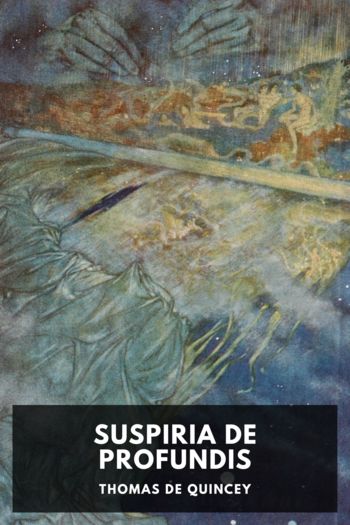Suspiria de Profundis by Thomas De Quincey (urban books to read .TXT) 📕

- Author: Thomas De Quincey
Book online «Suspiria de Profundis by Thomas De Quincey (urban books to read .TXT) 📕». Author Thomas De Quincey
The incident, so memorable in itself by its features of horror, and so scenical by its grouping for the eye, which furnished the text for this reverie upon sudden death occurred to myself in the dead of night, as a solitary spectator, when seated on the box of the Manchester and Glasgow mail, in the second or third summer after Waterloo. I find it necessary to relate the circumstances, because they are such as could not have occurred unless under a singular combination of accidents. In those days, the oblique and lateral communications with many rural post-offices were so arranged, either through necessity or through defect of system, as to make it requisite for the main northwestern mail (i.e., the down mail) on reaching Manchester to halt for a number of hours; how many, I do not remember; six or seven, I think; but the result was that, in the ordinary course, the mail recommenced its journey northwards about midnight. Wearied with the long detention at a gloomy hotel, I walked out about eleven o’clock at night for the sake of fresh air; meaning to fall in with the mail and resume my seat at the post-office. The night, however, being yet dark, as the moon had scarcely risen, and the streets being at that hour empty, so as to offer no opportunities for asking the road, I lost my way, and did not reach the post-office until it was considerably past midnight; but, to my great relief (as it was important for me to be in Westmoreland by the morning), I saw in the huge saucer eyes of the mail, blazing through the gloom, an evidence that my chance was not yet lost. Past the time it was; but, by some rare accident, the mail was not even yet ready to start. I ascended to my seat on the box, where my cloak was still lying as it had lain at the Bridgewater Arms. I had left it there in imitation of a nautical discoverer, who leaves a bit of bunting on the shore of his discovery, by way of warning off the ground the whole human race, and notifying to the Christian and the heathen worlds, with his best compliments, that he has hoisted his pocket-handkerchief once and forever upon that virgin soil: thenceforward claiming the jus dominii to the top of the atmosphere above it, and also the right of driving shafts to the centre of the Earth below it; so that all people found after this warning either aloft in upper chambers of the atmosphere, or groping in subterraneous shafts, or squatting audaciously on the surface of the soil, will be treated as trespassers—kicked, that is to say, or decapitated, as circumstances may suggest, by their very faithful servant, the owner of the said pocket-handkerchief. In the present case, it is probable that my cloak might not have been respected, and the jus gentium might have been cruelly violated in my person—for, in the dark, people commit deeds of darkness, gas being a great ally of morality; but it so happened that on this night there was no other outside passenger; and thus the crime, which else was but too probable, missed fire for want of a criminal.
Having mounted the box, I took a small quantity of laudanum, having already travelled two hundred and fifty miles—viz., from a point seventy miles beyond London. In the taking of laudanum there was nothing extraordinary. But by accident it drew upon me the special attention of my assessor on the box, the coachman. And in that also there was nothing extraordinary. But by accident, and with great delight, it drew my own attention to the fact that this coachman was a monster in point of bulk, and that he had but one eye. In fact, he had been foretold by Virgil as
“Monstrum horrendum, informe, ingens, cui lumen ademptum.”
He answered to the conditions in every one of the items:—1, a monster he was; 2, dreadful; 3, shapeless; 4, huge; 5, who had lost an eye. But why should that delight me? Had he been one of the Calendars in the Arabian Nights, and had paid down his eye as the price of his criminal curiosity, what right had I to exult in his misfortune? I did not exult; I delighted in no man’s punishment, though it were even merited. But these personal distinctions (Nos. 1, 2, 3, 4, 5) identified in an instant an old friend of mine whom I had known in the south for some years as the most masterly of mail-coachmen. He was the man in all Europe that could (if any could) have driven six-in-hand full gallop over Al Sirat—that dreadful bridge of Muhammad, with no side battlements, and of extra room not enough for a





Comments (0)